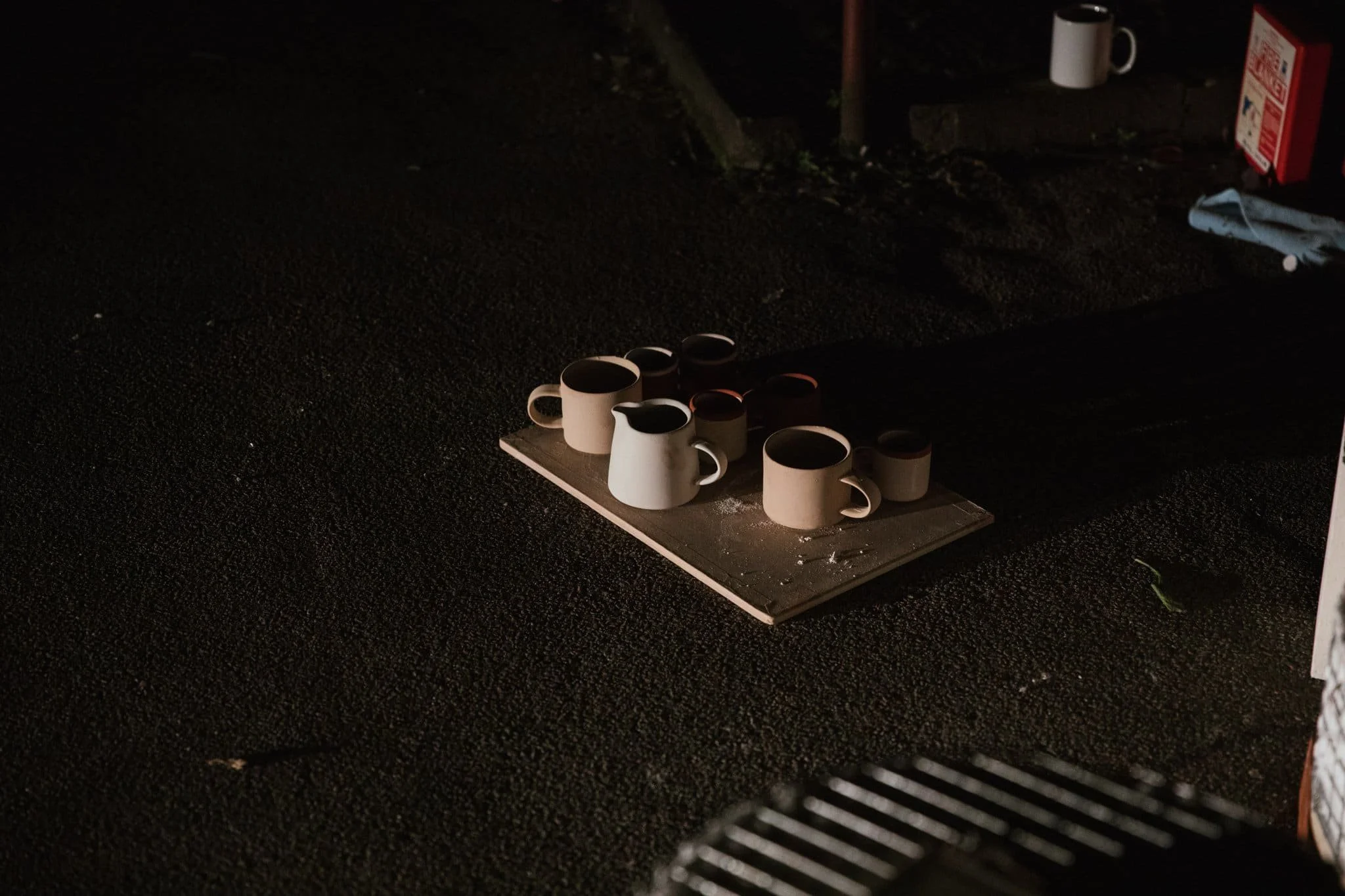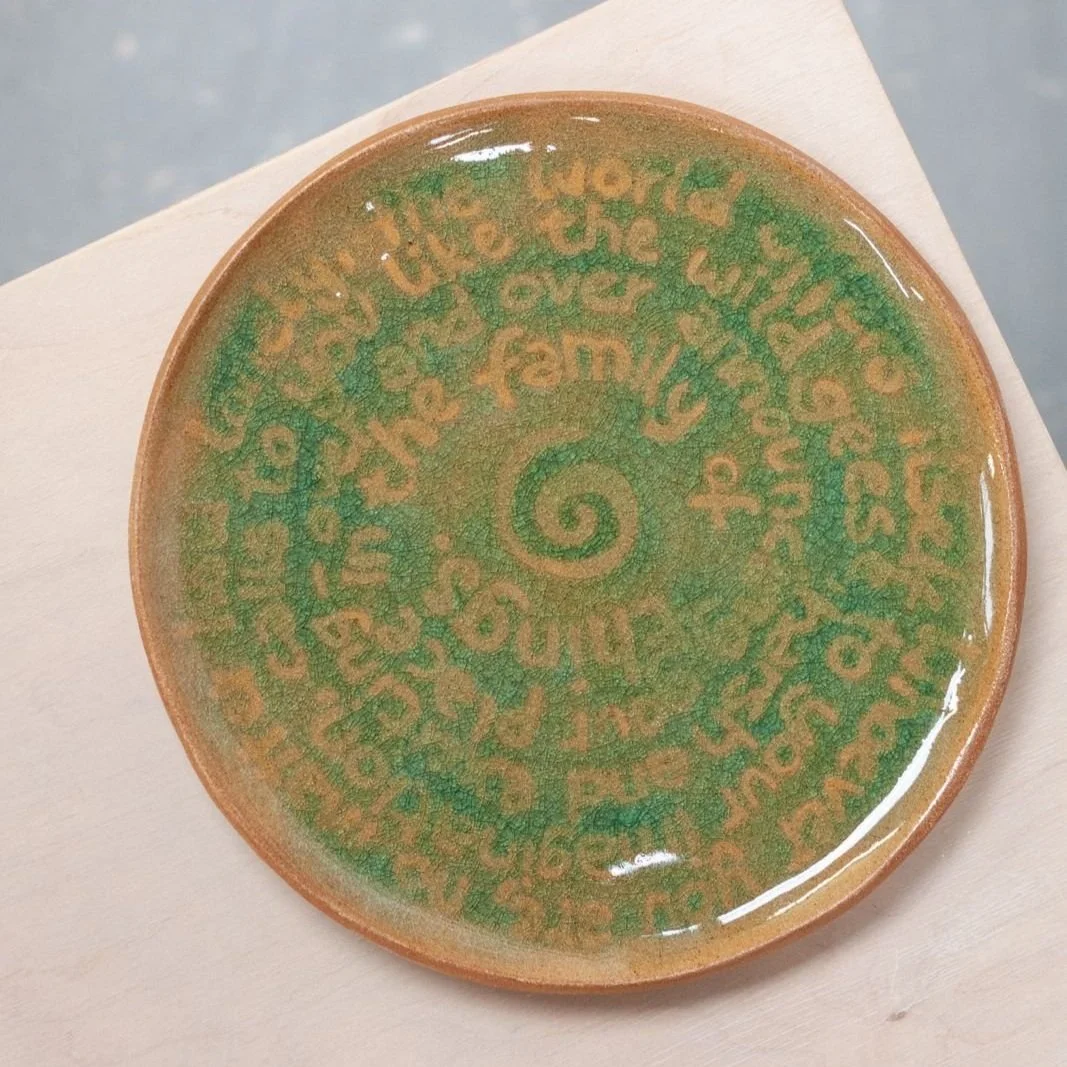
Hello!
Sunken Studio, nestled in South Bank Leeds, is a vibrant coworking pottery. We aim to transform pottery making into a collaborative journey, fostering a sense of belonging in an open, clean, and spacious environment. Our studio is designed for adaptability, welcoming beginners and emerging makers. Here, we work side by side, sharing ideas and life with clay in a place that values flexibility, innovation, and collective growth.
“Really knowledgeable guidance from the experts in a friendly, welcoming environment. Highly recommend.” Yoga Bradford
Hand-building Courses
“I had an amazing time learning how to handbuild. The studio is so well set up and everyone was so welcoming. I would highly recommend this to anyone wanting to learn or improve their skills.” Leona KB

Pot Luck
Experience a surprise pottery session where you’ll explore hand-building techniques. This is a low-commitment way to experiment with pottery.
Content: Hand-building techniques, surprise project.
Duration: 1.5 hours
Includes: Materials, firing one pot per person, aprons, and tools.
Prerequisites: None
Make a Mug
Craft a mug for your favourite brew. Learn how to handbuild a mug body, add playful handles, and add textured decoration. Your finished mug will be fired to stoneware with a glossy transparent glaze, making it ready for use.
Content: Mug bodies, handles, clay management, finishing, impressed and moulded decoration.
Duration: 2.5 hours
Includes: Materials, firing one pot per person, aprons, and tools.
Prerequisites: None
Handbuilding for Beginners
Learn the fundamentals of handbuilding ceramics. You’ll master key techniques and develop the skills to create functional pots.
Content: Slab building, coil building, pinch pots, impressed decoration, moulded decoration, extruding, glazing, and workspace management.
Duration: 12-15 hours
Includes: Materials, firing 4-6 pots per person, aprons, and tools.
Prerequisites: None
Throwing Courses
“A gem of a studio! I did the 12-week Pottery for Beginners course and absolutely loved it. The space is beautiful, really well equipped and the tutors are brilliant at sharing their knowledge and encouraging you at every step.” Chloe H

Throwing Taster
Fast and filthy. Have a go on a potter’s wheel. Learn how to centre, cone, open, and lift clay. Work your way through the steps needed to throw a pot and try your hand at making cylinders. At the end of the session, you’ll select one piece to fire and keep.
Content: Wheel control, posture, centering, coning, opening up, collaring in, lifting a wall, compressing walls and rims, using a rib, wiring-off, wipe down.
Duration: 2.5 hours
Includes: Materials, firing one pot per person, aprons, and tools.
Prerequisites: None
Foundations in Pottery Wheel Throwing
Start your throwing journey by learning the basics of using a potter’s wheel. Over six weeks, you’ll master techniques to create simple cups and bowls.
Content: Wheel control, throwing, trimming, glazing.
Duration: 12-15 hours
Includes: Materials, firing up to 8 pots per person, aprons, and tools.
Prerequisites: None
Glaze Courses
“Wonderful community space. I’ve been a member here since January 2024 and have truly enjoyed every moment I’ve spent here. The facilities are excellent and the tuition first class. Can’t recommend giving a class or tester session a go highly enough! You’ll find yourself wanting to join our community in no time!” Phil A

Make a Glaze (Part 1)
Learn to mix your own glazes from raw materials. This course covers the basics of glaze science and provides hands-on experience in creating brush-on glazes.
Content: Mixing glazes, glaze science, using Glazy.org, safe glaze making.
Duration: 15 hours over 6 weeks
Includes: 5 batches of 400ml brushing glazes.
Prerequisites: None
Requirements: P3 respirator, laptop, notebook.
Make a Glaze (Part 2)
Build on your knowledge from Part 1 by learning advanced glaze techniques. You’ll create over 36 unique glazes and learn to predict glaze behaviour before firing.
Content: Advanced glaze modification, glaze science, testing on various clay bodies.
Duration: 15 hours over 6 weeks
Includes: 36 unique glaze variations, 4 batches of 400ml brushing glazes.
Prerequisites: Completion of Make a Glaze Part 1 or significant prior experience.
Requirements: P3 respirator, laptop, notebook.
Glaze Club
We are developing an exclusive Glaze Club for members who have completed Make a Glaze Part 1. You’ll have access to our studio resources and materials to continue developing your glazes. Raw materials will be available on a pay-per-use basis, providing flexibility as you refine your understanding. Stay tuned as this opportunity continues to take shape.
Decorative Courses
“I went here with a friend to do pottery painting and we had the best time! It was such a relaxing and welcoming space. There was a great range of paints and items to choose from, and the whole experience felt really special.” Katie M

Paint a Pot
Elevate your tablescape with hand-painted, wheel-thrown pottery. Use our handcrafted bisqueware as a canvas for your designs. Mix colours from our curated palette and create a piece that’s personal to you.
Content: Hand-painted bisqueware, colour mixing, decoration.
Duration: Up to 2.5 hours
Includes: Access to the studio. Bisque pots for painting are purchased during the session (starting at £15).
Prerequisites: None
Enrichment Programme

Visiting makers, exhibitions, events and markets
A critical part of making is how we think, question, and evolve. Our Enrichment Programme offers opportunities to deepen your practice through dialogue, shared experience, and exposure to a wide range of approaches. From exhibitions to conversational demonstrations with visiting makers, it’s designed to sustain creative engagement beyond formal education.
Enrichment programmes are first announced via the Newsletter.
Our Teaching Philosophy

Building Strong Foundations and Respecting Your Time
In our ceramics courses, we focus on addressing the fundamental needs of a ceramics practice - starting with the basics of technique and material understanding. We guide you through essential skills like crafting basic forms such as straight-sided pots, cylinders, or bowls, laying the groundwork for more advanced challenges.
Throughout our courses, various key aspects of ceramics are covered, often including glazing, to ensure you gain a well-rounded understanding of the craft. These foundational techniques are the building blocks of your ceramics journey, preparing you for the creative challenges that lie ahead.
For those looking to explore their individual creative interests beyond structured courses, our memberships offer the time and space to pursue personal projects. Memberships provide the flexibility to work at your own pace, within the supportive environment of our well-resourced studio. A key benefit of our membership is access to Support Sessions, where you receive personalised support tailored to your needs, helping you make the most of the time you invest.
Our teaching approach is centered on simplicity and efficiency. We believe that limitations and constraints help focus on what truly matters, ensuring that you’re familiar with each step before moving on to more complex techniques.
We respect your time. While you could learn ceramics through online videos or trial and error, our courses offer direct answers and shortcuts that make the learning process more purposeful and efficient. Our expertise, drawn from years of experience, provides insights that aren’t always available in standard tutorials - insights that often emerge in the collaborative environment of a shared studio space.
Located in the heart of Leeds, our studio is spacious, adaptable, and equipped with all the resources you need to explore various techniques and processes. As a well-organised, specialist-led environment, our studio offers a sense of belonging and affiliation, where you can connect with others who share your enthusiasm for ceramics.
This blend of structured courses and flexible membership opportunities ensures that when you’re ready to take on creative challenges, you have a strong foundation.
People

Who Joins Our Courses?
Clay is a unique medium that resonates deeply with our participants. Its tactile qualities and the process of working with it demand a relationship of care and attention. Unlike many other materials, clay requires ongoing commitment - offering a healthy co-dependent relationship that fosters well-being. From building forms with breath to managing its fragility, working with clay provides a rewarding experience where you can take control of your time, engaging with the material in ways that offer both personal satisfaction and a sense of presence.
Our courses attract a mix of individuals seeking to create things for themselves, solve problems, and connect with the material in a meaningful way. Many are drawn by a curiosity to work with their hands, using their time to craft something personal and tangible, often as a respite from the fast-paced, digital, and admin-heavy aspects of modern life. The goal for most is to find a calm, focused space where they can engage with a material that requires care and attention - providing a satisfying, hands-on experience that contrasts with the frictionless world we’re becoming accustomed to.
At our studio, you’ll find a community of like-minded adults coming together in a safe, welcoming environment, free from distractions. Participants value the peace, the freedom, and the opportunity to ask questions when needed. What sets our studio apart is the carefully organised, spacious, and friendly atmosphere, conveniently located within walking distance of the city centre, with public transport access.
Our Team
Our team brings together a diverse range of educational backgrounds and experiences. Many of our instructors have completed formal post-compulsory education, from foundation courses to postgraduate degrees in fine art, jewelry and metalsmithing, art and design, ceramics, and industrial design. This includes a mix of academic and technically focused training. Several team members also hold post-compulsory PGCEs, equipping them with strong pedagogical skills.
In addition to those with traditional creative career paths, our team includes career changers who have pursued varied routes before joining us. Rather than following the standard academic progression, these team members have often worked in other fields, bringing with them skills that enhance the studio’s customer-centric approach. Their varied experiences introduce a fresh perspective, adding depth to the team and providing an alternative to the typical creative career journey. Whether taught by in-house trained staff, those building their skills, or seasoned professionals with years of experience, you’ll benefit from the rich expertise our team offers.
Resources and Facilities

Studio Environment
Our studio is a dedicated, adult-only ceramics space located in central Leeds. Led by specialists, the studio provides a tranquil and supportive atmosphere. The environment is characterised by clean lines and spacious work areas, ensuring that students have the room and peace needed to focus on making. Attendees must be 18 or older, and you’ll often be surrounded by our experienced studio members, who contribute to the calm and focused vibe of the space.
Tools and Equipment
We have an extensive range of tools and equipment to support your learning:
Potter’s Wheels: each participant in any of our wheel-based courses will have exclusive use of their own wheel throughout the duration of the course, ensuring a focused and personal learning experience. Wheels are not shared unless a specific project within a course calls for collaborative work.
Handbuilding Equipment: Includes a slab roller, whirlers, rolling mats, rolling pins, texture tools, and large workbenches designed specifically for handbuilding techniques. We also have a wall-mounted lever extruder with associated dies, which is particularly useful for extruding coils of various sizes, handles, walls, and other formed lengths. We provide a range of moulds in the studio, including bisque, plaster, and wooden moulds, all designed for various techniques such as press, drape, hump, slump, and drop-formed pieces. These versatile moulds are used in many of our classes, offering you the opportunity to experiment with different forms and shaping methods.
Small Tools: During courses, we lend students all the tools needed to complete their projects. After completing a course, you’ll have access to our member shop, where you can purchase some of the tools and equipment you’ve sampled.
Kilns: We have electric kilns for firing your pots, ensuring a professional finish.
Storage Facilities: We provide damp storage bays, poly boxes, and reusable boxes for storing work in progress, with clay management services included as part of the courses.
Wedging Bench: our heavy-duty concrete wedging bench is designed for practicing the essential skill of wedging clay. Set at a lower height than our workbenches, this bench provides a good ergonomic position, making it easier for you to develop and refine your wedging technique.
Materials
We supply a wide variety of materials to ensure you have everything needed for your projects:
Clays: All clays used in our classes are fired to stoneware. Clays are carefully selected based on their suitability for specific processes. Our clays are supported by recycling facilities to reduce waste and promote sustainability.
Glazes: We provide 10 house glazes for use in both classes and by studio members, allowing for a range of surface finishes and functional results.
Slips and Underglazes: Slips and underglazes are available for exclusive use in classes where specified.
Raw Materials: All raw materials required for the formulation of glazes are provided during our glaze classes.
Space to Breathe
Our studio fosters a creative community where students can collaborate, share ideas, and grow together. After completing a course, you have the opportunity to join our studio as a member, where you can continue your creative journey in a supportive environment. We offer support sessions regularly throughout the week, where you can access additional guidance from tutors and our specialist team.


















